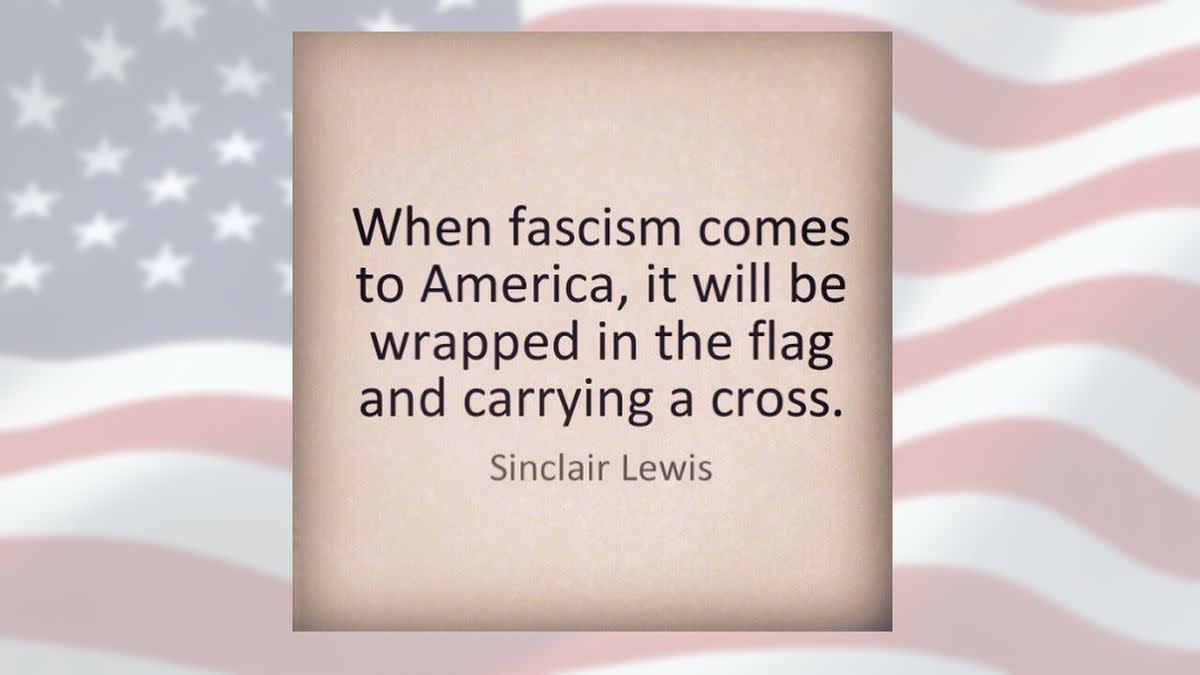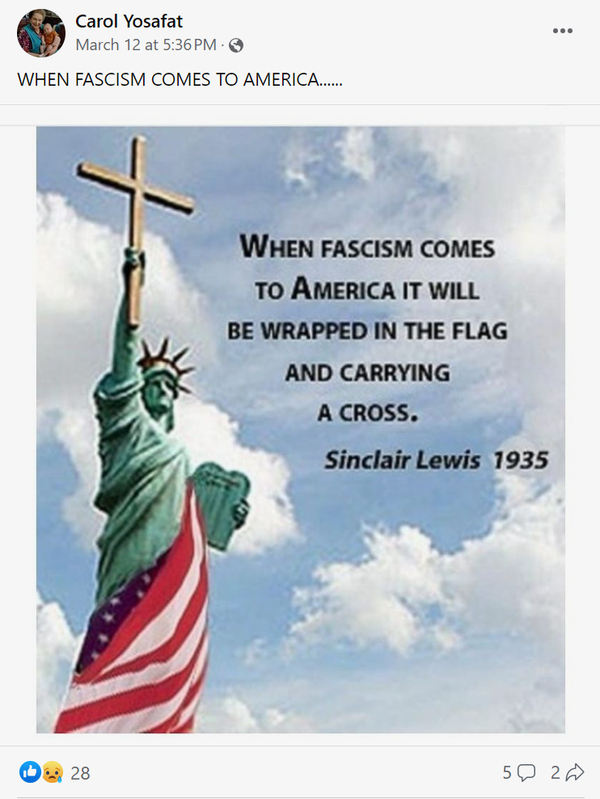Fact Check: Sinclair Lewis Allegedly Said Fascism Would Come to America 'Wrapped in the Flag and Carrying a Cross.' We Hunted for the Source

Claim:
Sinclair Lewis said "When fascism comes to America it will be wrapped in the flag and carrying a cross."
Rating:
Internet memes purporting to quote a statement by 20th-century novelist Sinclair Lewis about fascism coming to America have circulated more or less continuously since the mid-2000s, even though there is no evidence he ever penned or uttered this statement: "When fascism comes to America, it will be wrapped in the flag and carrying a cross."
This example was posted to Facebook on March 12, 2024:

(Facebook post)
Sinclair Lewis (1885-1951), produced such 20th-century classics as "Main Street," "Elmer Gantry," "Dodsworth," and "Babbit," also literally wrote the book on the fascist takeover of America. The premise of "It Can't Happen Here," published at a time (1935) when authoritarian regimes were flexing their muscles all across Europe and Americans had great difficulty imagining a Hitler or Mussolini coming to power in the Land of the Free, was that it can happen here.
In the novel, Lewis painted a vivid counterfactual portrait of a United States of America sliding into dictatorship, one that is still cited as a cautionary tale to this day. As The Paris Review noted on Nov. 16, 2016:
Sinclair Lewis's 1935 novel, It Can't Happen Here, is sold out everywhere online. If you're wondering why, here's the synopsis: "The main character, Buzz Windrip, appeals to voters with a mix of crass language and nativist ideology. Once elected, he solidifies his power by energizing his base against immigrants, people on welfare, and the liberal press."
However, nothing resembling the statement "When fascism comes to America, it will be wrapped in the flag and carrying a cross" appeared in that book, or indeed in anything else Lewis wrote during his lifetime.
And although it sounds like a sentiment Lewis would have agreed with, according to the website of the Sinclair Lewis Society there is no evidence he said it:
Here's our most asked question:
Q: Did Sinclair Lewis say, "When Fascism comes to America, it will be wrapped in the flag and carrying a cross"?
A: This quote sounds like something Sinclair Lewis might have said or written, but we've never been able to find this exact quote. Here are passages from two novels Lewis wrote that are similar to the quote attributed to him.
From It Can't Happen Here: "But he saw too that in America the struggle was befogged by the fact that the worst Fascists were they who disowned the word 'Fascism' and preached enslavement to Capitalism under the style of Constitutional and Traditional Native American Liberty."
From Gideon Planish: "I just wish people wouldn't quote Lincoln or the Bible, or hang out the flag or the cross, to cover up something that belongs more to the bank-book and the three golden balls."
There was also a play called Strangers in the late 1970s which had a similar quote, but no one, including one of Lewis's biographers, Richard Lingeman, has ever been able to locate the original citation.
The same quote has been erroneously attributed to Louisiana governor and U.S. senator Huey Long (1893-1935), who, ironically, was said by some to be a real-life model for Lewis's fascist leader in "It Can't Happen Here." A similar quote (probably spurious as well) attributed to Huey Long after his death was, "When fascism comes to America, it will be called anti-fascism."
Though we have found passages by other authors that share certain words, phrases, and sentiments in common with the quote attributed to Lewis, we have not found an exact match anywhere. We came across this bit, for example, in coverage of a speech by one James Waterman Wise Jr. in the Feb. 5, 1936, edition of The Christian Century:
James Waterman Wise, Jr., in a recent address here before the liberal John Reed club said that Hearst and Coughlin are the two chief exponents of fascism in America. If fascism comes, he added, it will not be identified with any "shirt" movement, nor with an "insignia," but it will probably be "wrapped up in the American flag and heralded as a plea for liberty and preservation of the constitution."
And this observation appeared in John Thomas Flynn's "As We Go Marching," published in 1944:
But when fascism comes it will not be in the form of an anti-American movement or pro-Hitler bund, practicing disloyalty. Nor will it come in the form of a crusade against war. It will appear rather in the luminous robes of flaming patriotism; it will take some genuinely indigenous shape and color, and it will spread only because its leaders, who are not yet visible, will know how to locate the great springs of public opinion and desire and the streams of thought that flow from them and will know how to attract to their banners leaders who can command the support of the controlling minorities in American public life. The danger lies not so much in the would-be Fuhrers who may arise, but in the presence in our midst of certainly deeply running currents of hope and appetite and opinion. The war upon fascism must be begun there.
Sources:
Close, Kerry. "Sinclair Lewis Novel 'It Can't Happen Here' Sells Out Online." Time. 16 November 2016.
Flynn, John Thomas. As We Go Marching. Auburn, AL: Ludwig Von Mises Institute, 1944. ISBN 9781610164979.
Lewis, Sinclair. It Can't Happen Here. New York: Doubleday, 1935.
Harris, Malcom. "It Really Can Happen Here: The Novel That Foreshadowed Donald Trump's Authoritarian Appeal. Salon. 29 September 2015.
The Christian Century, Volume 53. "Speakers Draw Dark Picture of Future." Chicago: Christian Century Company, 1936
The Sinclair Lewis Society. "Here's Our Most Asked Question." 2012.

 Yahoo News
Yahoo News 

